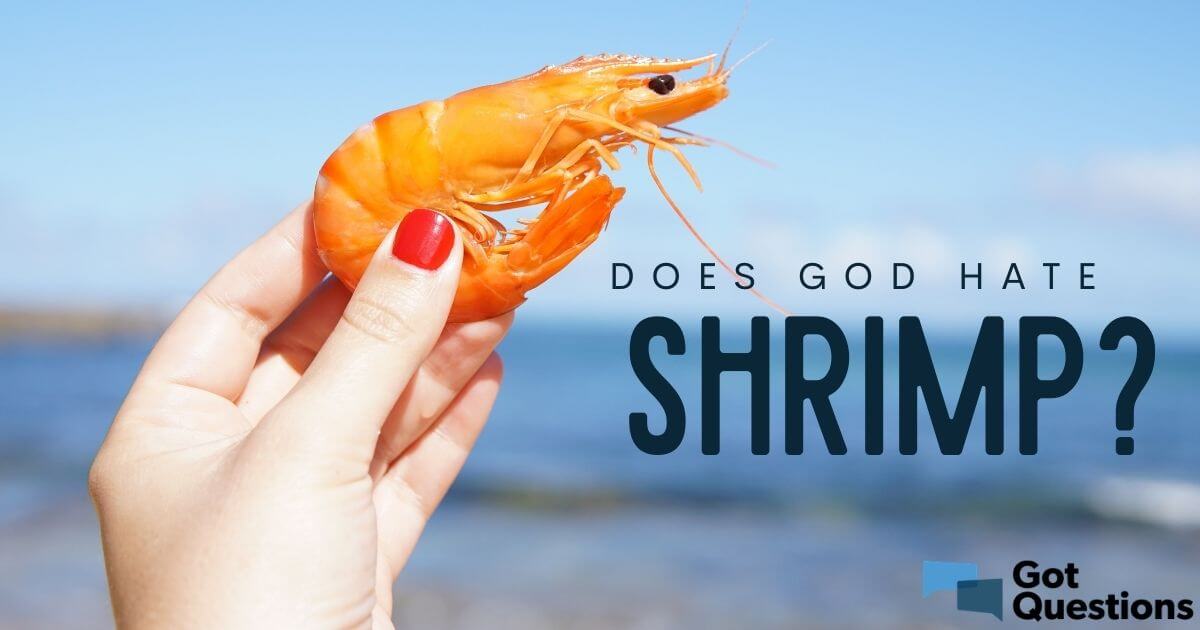Are Christians allowed to enjoy that tasty shrimp cocktail at a seafood restaurant? This is a question that has been debated for hundreds of years and has led to many discussions among Christians. Some say that the laws in the Old Testament that said you couldn’t eat shellfish are still in effect, while others say that those laws were taken away when the New Testament came out. So, let’s read what the Bible says about this controversial subject and find out if Christians can eat shrimp.
Shrimp is one of the most popular seafoods around the world The sweet taste and delicate texture make shrimp an appetizing choice for many recipes However, some Christians wonder if eating shrimp goes against teachings in the Bible. This article will examine what the Bible says about eating shrimp and other shellfish to help you make an informed decision for your diet and faith.
Old Testament Restrictions
Several verses in the Old Testament place restrictions around eating shrimp and other shellfish. The core verses are:
-
Leviticus 11 9-12 – God tells the Israelites that they may eat finfish with scales and fins but anything living in the water without scales and fins is “detestable” and must not be eaten This includes shrimp, lobster, crab, oysters and others
-
Deuteronomy 14:9-10 – Moses restates the command that the Israelites may only eat fish with scales and fins. All other water creatures are “unclean”.
Along with Leviticus 11, Deuteronomy 14 contains a comprehensive list of land animals birds and water creatures that God declared as “clean” or “unclean” for the Israelites to eat. Shellfish are called out several times as being unclean.
The restrictions around unclean foods applied not just to diet but also touching their carcasses (Leviticus 11:8). Eating or touching unclean foods was considered defiling oneself before God.
Why Were Some Foods Restricted?
The Bible does not give a specific reason for God restricting the Israelites from eating shellfish and certain other foods. However, Bible scholars have surmised some possible reasons:
-
Health – One of the most common explanations is that God wanted to protect the Israelites from disease and food poisoning. Shellfish are scavengers and are more likely to harbor bacteria, viruses and biotoxins that can make humans sick.
-
Separation – By limiting which animals they could eat, God separated his people from neighboring tribes who ate non-kosher foods. This was part of keeping the Israelites set apart for God’s purposes.
-
Spiritual – Some Bible teachers believe God wanted the Israelites to focus on spiritual cleanliness rather than just physical cleanliness. Avoiding certain foods kept them spiritually separated unto God.
So for the ancient Israelites, not eating shrimp and shellfish was a matter of obedience, holiness and physical health according to God’s commands.
Teachings of Jesus Christ
In the New Testament, Jesus brought a new perspective on diet and holiness laws. Several key teachings show that Christians are not bound to the Old Testament food restrictions:
-
Mark 7:19 – Jesus declared all foods clean. This occurred in a discussion about spiritual purity versus physical purity.
-
Matthew 15:11 – Jesus clarified that what enters the mouth does not defile a person, but what comes out of the mouth defiles. Again, Jesus stressed spiritual purity over physical purity laws.
-
Mark 7:18-19 – Mark reiterated Jesus’ teaching that no food can spiritually defile a person because it only enters the stomach and doesn’t affect the heart. Jesus “declared all foods clean”.
-
Acts 10:15 – God gave Peter a vision telling him not to call unclean what God has made clean. This vision paved the way for non-Jewish people to become Christians without adhering to the Old Testament kosher laws.
-
1 Timothy 4:4 – Every creature of God is good if received with thanksgiving because it is consecrated by God’s word and prayer.
-
Romans 14:14 – Nothing is unclean in itself. But if someone considers a food unclean, then for that person it is unclean.
Based on these teachings, the New Testament makes it clear that Christians are free to eat shrimp, lobster, pork and other foods prohibited under the Mosaic Law. What matters most is each person’s conscience and inner purity before God.
Different Christian Perspectives
Within Christianity today there are differing viewpoints about eating shrimp and other previously forbidden foods:
-
Permitted – Most Christian denominations teach that all foods are clean under the New Covenant and abstaining from certain foods is not required. This includes major groups like Catholics, Orthodox, Anglicans, Lutherans, Methodists, Baptists and nearly all Protestant churches.
-
Discouraged – Some Christian groups discourage eating shrimp, pork and other Old Testament unclean foods even though they acknowledge Christians have the freedom to eat anything. They prefer to honor Biblical kosher rules for health or spiritual reasons but do not consider it a sin.
-
Prohibited – A small number of churches prohibit members from eating non-kosher foods like shrimp and pork. This includes some Pentecostal, Messianic Christian and Seventh Day Adventist groups. They believe Christians must continue obeying Old Testament food laws.
So differences exist among Christians regarding shrimp consumption. Each person’s convictions should be respected, as the New Testament gives freedom in this area.
Key Takeaways About Eating Shrimp
Looking at all the Biblical evidence, a few key conclusions can be drawn:
-
The Mosaic Law prohibited shrimp and shellfish as unclean foods for ancient Israelites.
-
Jewish kosher rules restricting shellfish no longer apply to Christians under the New Covenant.
-
Jesus and the New Testament teach that no foods are spiritually unclean in themselves.
-
Christians have freedom in Christ to eat shrimp, lobster, pork and other Old Testament forbidden foods with a clear conscience.
-
Each Christian should follow their own spiritual convictions about diet while not judging others who hold different views.

What is forbidden to eat in Christianity?
Moses and the Israelites are told exactly what to eat by God in the books of Leviticus and Deuteronomy in the Torah. These became known as the dietary laws or the Kosher diet.
All animals and animal products that don’t chew the cud and don’t have cloven hooves are off limits. So are fish without fins and scales, any kind of animal blood, shellfish and other creepy things, and some birds named in the Bible. All foods can be consumed outside of these groups.
What does the New Testament say about eating shrimp?

Nowhere in the New Testament of the Bible will you find the words shrimp, crab, or shellfish. They are all grouped together as unclean food from the sea.
A story about shrimp is told in three of the four gospels: Matthew, Mark, and Luke. This story is often used in the New Testament. The Book of John does not retell this story.
In this story, the Pharisees confront Jesus and His disciples about how they are eating.
Back in those times, it was a religious law to prepare or clean yourself before eating. The Pharisees sees Jesus and His disciples do not properly clean themselves prior to eating some bread.
After some back in forth, Jesus tells the Pharisees the following:
It is in Mark, and only Mark, where “(In Saying this. Jesus declared all food clean. )” This one sentence has added much confusion to scholars and Christians alike.
